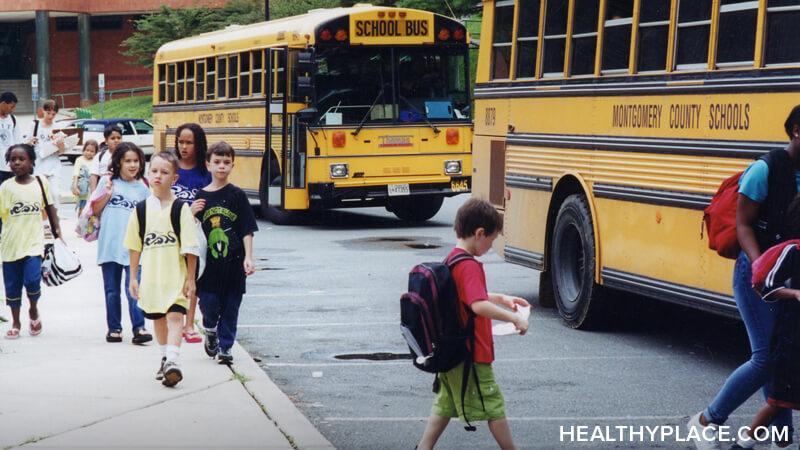Signs Your Child Is Experiencing Verbal Abuse At School

Signs your child is experiencing verbal abuse at school are important to recognize and respond to. School is back in session and so we send our babies, some in kindergarten and some in high school, off to their place of learning for six or so hours a day. It can be nerve-wracking to feel out of control and unsure of what is happening with our children for those hours, but keeping an eye on his or her at-home behavior can be a good indicator of how he or she is being treated at school. Continue reading to learn more about possible signs that your child is experiencing verbal abuse at school, in the classroom or on the playground.
Signs of Verbal Abuse at School
The following signs are indicative that something may be off with your child but are not definitive signs of verbal abuse at school, and require digging deeper ("What Parents Need to Know About Bullying"). If you start to notice any of the following behaviors, try talking with your child about his or her experience at school, reach out to the teacher, or volunteer to help one day in the classroom.
- Sleeping too much or too little -- Changes in sleep patterns are a possible sign that your child is stressed. If your child is oversleeping as a means of coping or losing sleep from anxiety, this may be indicative something is off. If your child appears to be lethargic or fatigued and is seemingly in good health and on a normal schedule, he or she may be struggling with anxiety, stress or depression, all of which can be a consequence of schoolyard verbal abuse.
- Faking sick or other ploys to stay home from school -- If your child will try anything to stay home from school, this may be a serious sign that he or she is having a bad experience in the learning environment. Are you picking up on repeated claims of stomach aches or a general feeling of unwellness? This is a potential sign your child fears, feel anxious or dreads going back to the classroom.
- Loss of appetite -- Another possible sign your child is stressed or depressed is a change in his or her appetite, particularly a loss of appetite. If your baby usually scarfs down a grilled cheese with avocado because it's his or her favorite and suddenly finds no happiness in the offer, this may be a red flag.
- Isolating -- If your child is walking home alone when he or she typically does so with friends, or if he or she walks in the door and unusually goes straight to his or her room this may be a sign of isolation. Socially withdrawing can come from social anxiety, anxiety in general and/or depression. If your kid is not the social butterfly you know him or her to be, look deeper into why that is and what seems to be the root cause.
- Suffering grades or poor participation -- If your child's normal academic effort is clearly dwindling it may be from a loss of interest, feelings of rejection, trouble concentrating or feelings of stress -- all of which are potential consequences of verbal abuse at school. A kid being verbally abused or bullied may feel uncomfortable making an effort or attempting to participate for the fear of being ridiculed.
- Changes in behavior -- Any other sudden changes in behavior are a reason for further investigation and should be looked into for your child's wellbeing and best potential for growth and happiness in their learning community.
If you are worried your child is experiencing verbal abuse at school, schedule a meeting with the teacher or counselor and make a plan of action. Talk to your child and encourage a safe space with open communication.
APA Reference
Sullivan, E.
(2018, August 29). Signs Your Child Is Experiencing Verbal Abuse At School, HealthyPlace. Retrieved
on 2026, January 30 from https://www.healthyplace.com/blogs/verbalabuseinrelationships/2018/8/signs-your-child-is-experiencing-verbal-abuse-at-school
Author: Emily J. Sullivan
School as specific psychosocial circumstances indicates great and intrigued issue for our children. In this direction education presents important process on healthy psychological and social development of this category of population. But in this complex social milieu might happen antisocila performances as result of verbal abuse of any young person. So, it is of crucial help to build and maintain good and healthy interpersonal relationship on huge and perplex social network, such is school environment. The positive role and constructive intervention of teachers and others experienced participants on education system is of substantial meaning. School psychologist are the most important expert to avoid or/and to soften verbal abuse of any children in school. Parents, also play important role on time prevention of verbal abuse of theirs children by detecting the primary signs of verbal abuse, which ones you purposefully had prepared. Mutual engagement of educational establishment and parent is the best way to prevent verbal abuse and others interpersonal harmful relationship in school, as benevolent and educational institution.